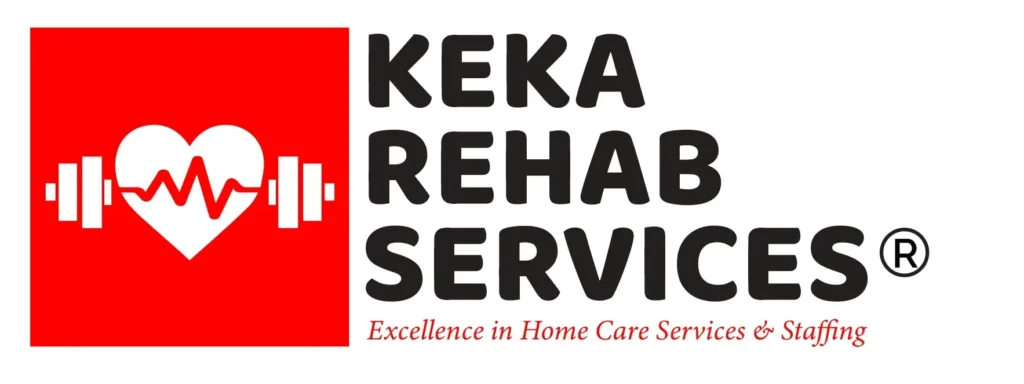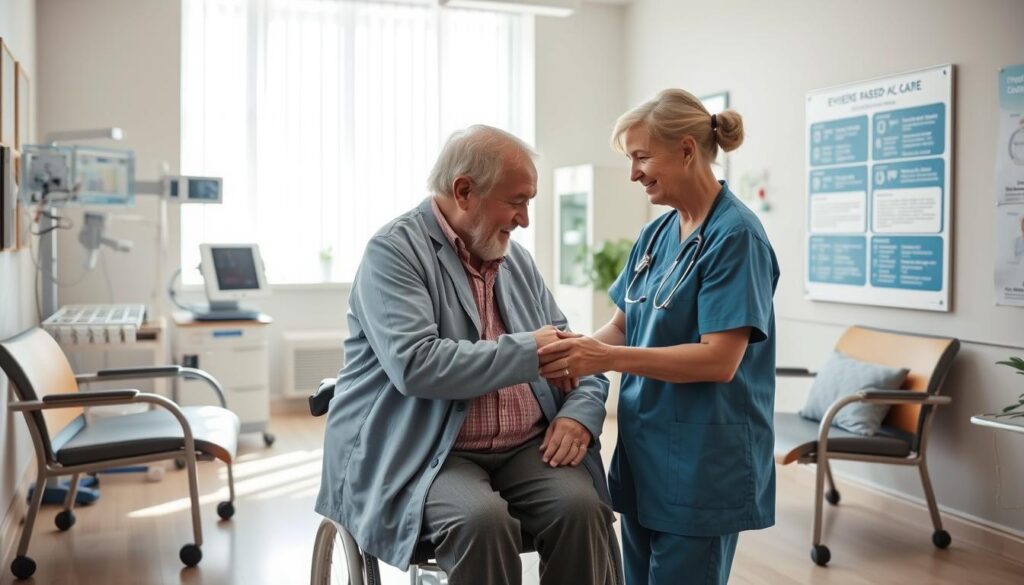Did you know that chronic diseases and falls are big problems for older Americans? They are the leading causes of death and disability. But they are also preventable. This shows how important it is to have good care for older patients.
More and more people are getting older. This means we need better healthcare strategies fast.
Evidence-based care helps older adults live better lives. It uses research, doctor’s skills, and what patients want. This care has many benefits, like helping seniors stay independent and feel better mentally.
Healthcare groups that use evidence-based care do better. They use resources wisely, get better results, and save money. A new edition of a senior care book has updates on chronic conditions and new care models.
We will examine ways to help seniors manage their health better. We will also discuss care that focuses on the person and how to use evidence-based programs in healthcare. These are key to giving the best care to our ageing population.
Key Takeaways
- Chronic diseases and falls in older adults are preventable
- Evidence-based care improves the quality of life for seniors
- EBPs lead to better health outcomes and lower costs
- Self-management strategies enhance elderly patient care
- Person-centered approaches are crucial in geriatric care
- Emerging care models address the evolving needs of the ageing population
Understanding Geriatric Evidence-Based Care Fundamentals
Geriatric medicine is facing significant challenges as more people get older. By 2050, almost 90 million Americans will be 65 or older. This means we need a firm plan for treating age-related diseases and caring for ageing.
Defining Evidence-Based Care in Geriatrics
Evidence-based care in geriatrics uses research and data to help older adults. This is important because over 50% of seniors have three or more health problems. This method helps find health issues and the best ways to keep the elderly well.
Core Components of Geriatric Care
The 4Ms framework, created in 2016, focuses on what matters: medication, mentation, and mobility for reliable care. This, along with self-management support, is key to good geriatric care. It teaches patients to manage their health, solve problems, and set goals.
Role of Clinical Expertise in Evidence-Based Practice
Clinical expertise is crucial in using evidence-based practices for each patient. Healthcare workers use a structured way to handle health problems in older adults. They consider what the patient wants, the evidence, and how to improve care. This care makes a big difference, improving both physical and mental health.
Self-Management Strategies for Elderly Patients
Evidence-based geriatrics shows how important self-management is for older adults. It helps them stay independent and live better lives. Elderly care guidelines often suggest self-management to help patients manage their health.
Building Patient Confidence and Independence
It’s essential to boost self-confidence in elderly patients. People in the Americas who live to 60 years old can expect to live 21 more years. This means they must learn to manage their health for a long time.
Programs like Better Choices and Better Health® have about 25 people in each group, which creates a good environment for learning together.
Daily Health Management Techniques
Geriatrics teaches daily health habits. The HealthMatters™ Program is for people with intellectual disabilities. And ¡Sí, Yo Puedo! is a 7-week program for diabetes.
These programs help because 12% of people over 60 in Latin America and the Caribbean need care.
Goal Setting and Progress Monitoring
Setting goals is very important in elderly care. The Wellness Recovery Action Plan (WRAP®) helps patients make plans to help themselves. It’s also important to check progress often, especially since 65% of 90-year-olds lose function when they go to the hospital.
Good self-management can keep people well and prevent them from returning to the hospital for a long time.
Geriatrics wants to improve the lives of older adults by using these strategies. Self-management lets them take charge of their health, which can even save money and lead to better health outcomes.
Integration of Evidence-Based Programs in Healthcare Systems
Healthcare systems face major challenges in caring for seniors. They need to use evidence-based programs to improve. Studies show that combining health and social care for seniors improves their health without costing more.

Geriatric assessments are very important for seniors. A study found 21 tools used in care programs. EASYcare and RAI-HC/RAI-CHA are often used. These help make care plans that fit each person’s needs.
But there are still problems. Only 16% of doctors check for dementia. This means about half of dementia cases are missed at the start. We need more training and better care plans for seniors.
Healthcare systems are working hard to fix these issues. Mass General is leading the way. They’re helping doctors find and treat dementia early. They’re also working with experts to fill care gaps. Their goal is to give better care to seniors and improve their health.
Addressing Age-Related Health Challenges
Geriatric care helps with health issues that come with age. It is important to deal with many health problems as you get older.
Managing Multiple Chronic Conditions
More than half of people over 65 have two or more health issues. Managing medicines is hard for them because of many prescriptions. HomeMeds and BRI Care Consultation help with these problems.
Prevention Strategies for Functional Decline
Keeping strong is key to staying independent. Falls are a big risk for older people, but research is helping to make things safer.
Programs like EnhanceFitness and Tai Chi help improve strength and balance.
Mental Health Considerations in Elderly Care
Mental health is significant for older adults. The IMPACT and PEARLS programs help with depression. Technology, like wearable devices, also helps with care.
It’s never too late to start being healthier. Using evidence-based programs can improve your quality of life as you age.
Person-Centered Care Approaches
Person-centred care is very important for older patients. It makes treatment plans fit each person’s needs and likes. The American Geriatrics Society says it’s about working together to make healthcare choices that match the person’s values.
Customizing Treatment Plans
Custom care improves the lives of seniors by helping them feel good and happy and letting them control their lives, which lowers stress and sadness.
Family Integration in Care Planning
Getting the family involved is very important. It builds a support team and ensures that care fits the patient’s values, which makes seniors happier with their care.
Cultural Competency in Geriatric Care
Understanding and respecting different cultures is key. Gerontological nurses use exceptional guides to help them care for everyone.
But there are challenges, like not having enough resources or time. Also, it takes a team to make it work. As more people get older, this will become even more important.
Creating Sustainable Healthcare Solutions for Aging Populations
Care for the ageing process needs new ideas to last. By 2030, people over 60 will make up 17% of the world’s population, and this number will grow to 22% by 2050. This change brings big challenges to healthcare systems everywhere.
Evidence-based geriatrics are key to finding lasting solutions. As the number of working-age people goes down, healthcare must change. It must meet more needs with less money. We need policies that help older adults care for themselves with family and community help.
New ways to pay for care are being tried. Japan and Bangladesh have shown good examples. They help older adults and their caregivers with money and services.
Taiwan shows the value of thinking big about ageing care. Experts say we need a complete plan for the elderly’s needs. This plan fits with global efforts to make healthcare better for older adults.
Working together is key as healthcare changes for older people. By using evidence-based geriatrics and new care ideas, we can improve healthcare, which will help older adults live better lives worldwide.
Quality of Life Enhancement Strategies
Improving life for seniors is very important. Good strategies help them stay independent, social, and active.
Promoting Independence and Autonomy
Keeping seniors independent is key. Studies show that teaching them about their home can help them stay on track. This lets them do their daily tasks, keeping them in control and proud.
Social Engagement Programs
Being social is good for the mind. Programs that help people with dementia feel better and find joy. Community centres and senior groups are great for meeting people and staying active.
Physical Activity Guidelines
Exercise is crucial for seniors. It makes them stronger and wiser and helps those with diseases like Alzheimer’s.
Using these strategies can help seniors. Caregivers can improve their lives by focusing on independence, socializing, and staying active. This can also prevent falls, which are a big worry for seniors.
Healthcare Workforce Development and Training
The field of geriatric medicine is facing significant challenges. With more older people, there’s a growing need for healthcare that fits their age. In 2021, over 962 million people were over 60 worldwide. This number is expected to hit 2 billion by 2050.
Training programs in geriatric medicine are changing to meet these needs. A study showed that team learning is 30% better than learning alone. This team approach helps maintain knowledge and promotes working together, which is key in caring for the elderly.
It’s also essential for healthcare workers to understand different cultures. In California, 44% of homes speak a language other than English, which means 19% have trouble speaking English well. Healthcare providers need to be able to provide care that fits each person’s culture and age.
Healthcare facilities use many methods to train workers. They mix hands-on learning with other methods, like supervision and teaching, to ensure workers can give top-notch care to older adults.
Technology Integration in Geriatric Care
Technology changes how we care for older adults. By 2050, 1.5 billion people will be over 65, which shows that we need new ways to care for them.
Telehealth Solutions
Telehealth lets doctors see patients at home, which is great for those who can’t move much or live far away. Video calls and remote health tracking help manage long-term health issues.

Remote Monitoring Systems
Remote monitoring watches over older patients. It checks their health, how they take medicine, and what they do daily. Studies show it reduces hospital visits for those with many health problems.
Digital Health Records Management
Electronic Health Records (EHRs) help doctors work together better. They can quickly access a patient’s health history, and using EHRs has led to fewer bed sores in hospitals.
It also helps make plans to prevent falls. This makes it less likely for older patients to fall in the hospital.
Even though technology is helpful, we must consider seniors’ skills and likes. Healthcare workers should make these tools fit each patient’s needs. This way, we can give the best care possible.
Cost-Effective Care Delivery Models
Senior health needs new ways to get quality care without spending too much. Evidence-based geriatrics is helping. It creates models that benefit older people’s health and save money.
A study of 951 seniors aged 65 and older found something interesting. The group that received special care spent less money over two years: $17,713 compared to $18,776 for usual care.
Good care programs adapt their plans to the local area and what patients need. They use technology to help with care planning and train their team well.
The GRACE model is for low-income seniors. It improved care and helped patients a lot. By the second year, high-risk patients had 35% fewer emergency visits and 44% fewer hospital stays.
Geriatrics, based on evidence, helps a lot. It focuses on early action, prevention, and care that fits each person. This way, care for older people can be better and cheaper. It also makes the best use of healthcare resources.
Long-Term Care Planning and Implementation
Planning for long-term care is key for older adults. A study showed that 53% of those in long-term care had dementia. This shows we need special care for them.
Facility-Based Care Options
Nursing homes are essential for older people. A UK study found that family help can improve care. This means family involvement can improve care quality.
Home Care Services
Home care is becoming more popular. However, it faces challenges like not having enough time or staff. Still, good leadership and plans can improve it.
Transition Care Management
Smoothly moving between care places is vital. A study found five critical points for family support in care homes. Research also shows that focusing on physical and social needs helps move care.
FAQ
What is evidence-based care in geriatrics?
Evidence-based care in geriatrics uses research to help older people. It aims to improve their health and happiness. This includes teaching them to manage their health and tailoring care to each person.
What are the core components of senior care?
Geriatric care focuses on helping patients manage their health. It uses education and problem-solving to help, and it ensures that care is tailored to each patient’s needs.
How can self-management strategies benefit elderly patients?
Self-management helps older adults handle health issues better. It builds their confidence and independence. This can make them feel better and save money on healthcare.
What is person-centered care in geriatric medicine?
Person-centred care is about treating each patient as an individual. It considers their needs and values. It also involves their family and respects their culture.
How can healthcare systems adapt to the growing demand for senior care?
Healthcare systems need to change to meet the needs of older adults. They should use proven programs and focus on chronic care. They also need to be cost-effective and address financial issues.
What role does technology play in senior care?
Technology is key in geriatric care. Offering telehealth and remote monitoring helps patients manage their health at home. Providers should consider patients’ tech comfort and skills.
How can quality of life be enhanced for older adults?
Promoting independence and social interaction can improve the quality of life for seniors. Programs should keep them physically and mentally active, which helps them age well and stay functional.
What is the importance of workforce development in senior care?
A skilled workforce is essential for quality senior care. It needs education and training in senior care. Providers should be able to communicate well and understand cultural differences.
What should be considered in long-term care planning for the elderly?
Long-term care planning should include home and facility care options, focus on keeping seniors independent, and address end-of-life care and resource allocation.
How can healthcare providers address mental health in elderly care?
Mental health is vital in senior care. Providers should prevent and manage mental issues and support seniors’ mental well-being.








